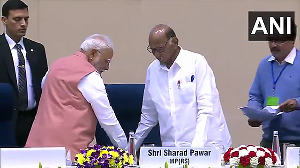The Janata Dal (S)-BJP coalition government in Karnataka is under fire for banning women from working on the night shift.
The government recently amended the law concerned to impose the ban. The only saving grace is that the IT/ ITES and hospitality sectors, electronic media and emergency services have been excluded from the ban.
However, other organisations like private business establishments, the entertainment industry and the print media cannot ask women to work night shifts (after 8 pm).
The law was amended after the High Court, which has taken up the case concerning the murder of a call centre employee, rapped the state government over inadequate security for women.
The amendment to the Karnataka Shops and Commercial Establishments Act 1961, which was passed by the state assembly in the last session, appears to have gone through without members bothering to look closely at the fine print.
According to the amendment, any entrepreneur violating the rule will face imprisonment up to six months with a penalty of Rs 10,000.
The new law has elicited protests from all sections of society and opposition political parties. The ruling parties are defending the move by arguing that this is the only way to bring down crimes against women when the police force is inadequate.
The case for the government has not been made easier by labour minister Iqbal Ahmed Ansari (JD-S), the concerned minister, arguing that "women working during nights is against our tradition."
The State Women's Commission has joined in the protest against the move. "It is a knee-jerk reaction. The amendment clearly violates Article 21 of the Constitution that guarantees the fundamental right to life. Even Parliament is not empowered to pass laws banning women from working in night shifts. This is not the way to bring down crimes against women. The rule will only reduce job opportunities for women," commission chairperson Prameela Nesargi said.
According to legal experts, the controversial amendment to the act is unlikely to stand the test of judicial scrutiny.








 © 2025
© 2025